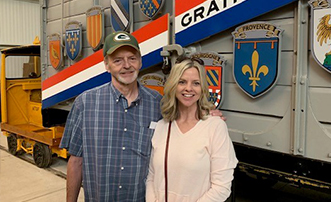In the 1970’s McDonald’s used “You deserve a break today” in their ad campaigns.
If you are a primary caregiver to someone you love, you most likely understand the sentiment, but how do you take a “break” from caregiving?
Many people who seek assistance from ADRC are caregivers or know someone who is a caregiver. Ensuring that caregivers have access to education and the support they need is vitally important to their own health and the health of the person under their care. ADRC has several programs to support family caregivers, including the two programs highlighted below that offer respite, information, support, and other resources to eligible family caregivers.
If you or someone you know is a caregiver who has a loved one with a dementia diagnosis, we have the Alzheimer’s Family Caregiver Support Program (AFCSP).
Example: Jane calls ADRC looking for help as she has recently invited her mom (Betty) to move in with her. Betty has been diagnosed with Dementia and is no longer safe at home alone. We learn that Betty watches TV all day or naps and Jane wishes she could find something to engage her. Jane shares that she is an avid runner; it helps her relax and decreases her stress. Using AFCSP funds, we were able to help both Jane and her mom by purchasing a three-wheel bike for Betty to ride. Now, Jane can run, getting her exercise, decreasing her stress AND her mom bikes along with her, safely getting her own exercise and fresh air while sharing quality time with each other.
If you or someone you know is a caregiver to a person 60 or older, a grandparent raising a grandchild, or other relative age 55 or older who is the primary caregiver for a child or an adult with a long-term disability, we have the National Family Caregiver Support Program (NFCSP).
Example 1:
A 73-year old woman calls ADRC. She is looking for help getting window air conditioners installed for her 98-year old mother. During the conversation, our Information & Assistant Specialist learn the caregiver is selling her home and moving across town. As a result of the move, she isn’t as available to help her mom as she has been in the past. Using NFCSP funding, this caregiver was able to get the window air conditioners installed and use the funds to hire someone to help with her mom’s laundry, housekeeping, and meal preparation.
Example 2:
John and Becky, both 60, unexpectedly find themselves raising their two small grandchildren. They call ADRC with questions on guardianship for the children. During the conversation, staff learn they are both still working full-time, and while they are happy to have their grandchildren with them, they are missing their time as a couple. By the end of the conversation, they learn help is available to them with NFCSP funding, both for the legal fees related to guardianship and to hire a babysitter to get away and reconnect as a couple on a regular basis.
Example 3:
Jill is in her early 60’s and cares for an adult daughter with a disability. Jill knows that she needs help but hiring someone from an agency is out of the question because her daughter, Becky, doesn’t want help and isn’t comfortable around strangers. Through the conversation with ADRC staff, Jill learns that there are several ways she can get help without making Becky uncomfortable, such as hiring someone she is comfortable with. As the conversation continues, Jill realizes she can hire the teenager next door to mow her lawn. She also learns that her sister can be paid to stay with Becky so she can re-join her book club on Wednesday nights.
These are just a few examples of how ADRC can help. As caregivers, we focus on the needs of our loved ones. The conversations had with each of our staff members helped these caregivers identify their needs, which will allow them a much-needed break and the ability to continue being the best caregiver possible.
Since no two caregiver’s needs are the same, you will work with staff to complete an individualized Needs Assessment to create a care-plan that works just for you and your current situation.
Being a primary caregiver for your loved one is a rewarding and loving experience; yet to be the best you can be, you need to take care of YOU, too! Both you and your loved one will benefit!
Below is a story of one family who utilized AFCSP funds:
Through a referral from a co-worker, I contacted ADRC about a year ago to find resources for my Dad, who has Alzheimer’s. ADRC has been invaluable to me over the past year in helping me walk through this journey. When I was starting to feel anxious about how to provide more in-home care for Dad, ADRC led me to the Alzheimer’s Family Caregiver Support Program, which helped immensely in the short-term to offset some costs so my Dad could get more care. I can’t tell you what a relief having those funds has been. Just to be able to be there for my Dad without having to worry about how to pay for the care he needs has been huge. Every little bit helps and I’m so appreciative of the AFCSP funding and all the caregiver specialists at ADRC!
~Melanie



